Indonesia to Germany Success: The Ausbildung Route Jakarta Professionals Choose
Jakarta professionals reveal their successful Ausbildung route to Germany. Indonesia's preferred pathway to German career success.

Table of Contents
- Understanding Ausbildung - Germany's Dual Education System
- Germany's Dual Education System
- What is Ausbildung and How It Differs from Traditional University Education
- Benefits of Combining Theoretical Learning with Practical Work Experience
- Career Prospects and Earning Potential After Ausbildung Completion
- Why Indonesian Professionals Are Choosing Germany
- Economic Opportunities and Salary Comparisons
- Germany's Skilled Worker Shortage and High Demand for International Talent
- Quality of Life, Work-Life Balance, and Social Benefits
- Popular Ausbildung Programs for Indonesian Students
- Healthcare Sector: Nursing, Medical Technology, and Pharmaceutical Roles
- Engineering and Manufacturing: Automotive, Mechanical, and Industrial Technology
- IT and Digital Technologies: Software Development and Cybersecurity Programs
- Step-by-Step Application Process from Jakarta
- Language Requirements: German Proficiency Levels and Preparation Timeline
- Document Preparation and Credential Recognition Procedures
- Finding Ausbildung Positions and Employer Partnerships
- Overcoming Common Challenges and Barriers
- Language Learning Strategies and Resources Available in Jakarta
- Cultural Adaptation Tips and Building Professional Networks
- Financial Planning: Costs, Scholarships, and Earning While Learning
- Success Stories from Indonesian Ausbildung Graduates
- Career Progression Examples in Different Industries
- Salary Growth and Professional Development Outcomes
- Long-term Settlement and Citizenship Pathways
- Preparing for Your Ausbildung Journey
- Timeline for Application Preparation (12-18 Months in Advance)
- Essential Resources and Support Organizations in Jakarta
- Next Steps and Action Plan for Prospective Applicants
- Frequently Asked Questions
- Question 1: What emergency contacts and support systems are available for Indonesian students during Ausbildung in Germany?
- Question 2: How do I handle homesickness and cultural adjustment during the initial months of Ausbildung?
- Question 3: What are the realistic monthly living costs for Indonesian students during Ausbildung, and how can I budget effectively?
- Question 4: Can I switch Ausbildung programs or companies if I'm unhappy with my choice?
- Question 5: How do I maintain my Indonesian citizenship while potentially pursuing German permanent residency?
- Question 6: What happens if I fail my Ausbildung exams, and what are my options for recovery?
- Question 7: How can I leverage my Ausbildung experience to eventually bring family members to Germany?
- Question 8: What are the pathways for career advancement after completing Ausbildung, and how do they compare to university graduates?
- Conclusion
Imagine landing at Frankfurt Airport with a guaranteed job contract, a clear career path, and the opportunity to earn while you learn in one of Europe's strongest economies. For thousands of Indonesian professionals, this dream has become reality through Germany's Ausbildung program – a unique vocational training system that's creating unprecedented opportunities for skilled workers worldwide.
While many Indonesian students traditionally pursue university degrees or seek opportunities in neighboring Asian countries, a growing number are discovering that Germany's dual education system offers something extraordinary: immediate employment, practical skills development, and a direct pathway to long-term career success in Europe. Unlike traditional academic programs, Ausbildung combines classroom learning with hands-on work experience, allowing you to earn a salary from day one while building expertise in high-demand fields.
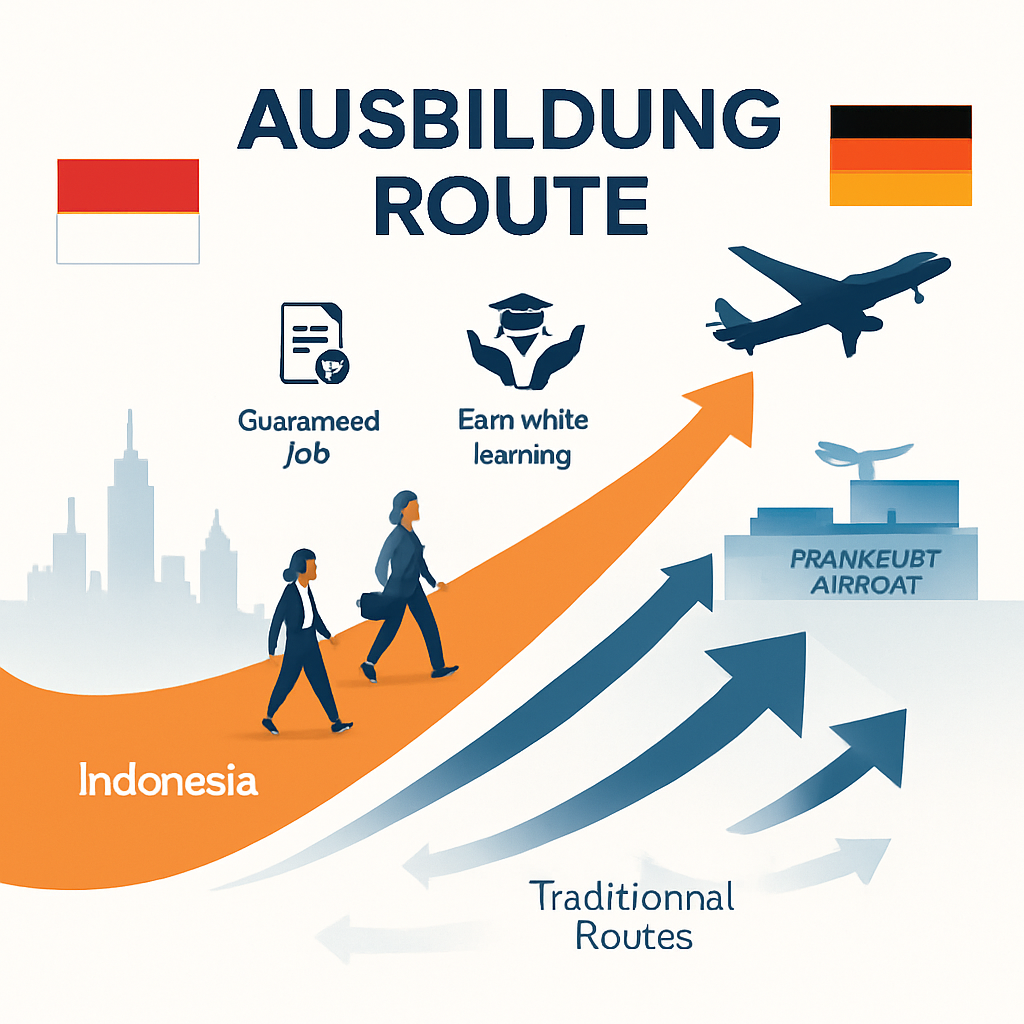
The numbers speak for themselves. Germany faces a critical skilled worker shortage, with over 2 million unfilled positions across healthcare, engineering, IT, and manufacturing sectors. This labor gap has created an unprecedented window of opportunity for international applicants, particularly from Indonesia, where technical skills and strong work ethics are highly valued by German employers.
However, navigating the Ausbildung how the application process works from Jakarta can feel overwhelming. From German language preparation guide requirements to credential recognition, visa procedures to cultural preparation, the journey requires careful planning and strategic execution. Many potential applicants struggle with questions about program selection, application timelines, and long-term career prospects.
This comprehensive Ausbildung guide addresses these challenges head-on, providing you with insider knowledge from successful Indonesian Ausbildung graduates, step-by-step application strategies, and practical insights into building a thriving career in Germany. Whether you're a recent graduate, career changer, or experienced professional seeking new opportunities, you'll discover how the Ausbildung route can transform your professional trajectory and open doors to European career success.
Understanding Ausbildung - Germany's Dual Education System
Germany's Dual Education System

Germany's dual education system, known as "Ausbildung," represents one of the world's most successful vocational training models. This system combines theoretical classroom learning with hands-on practical experience in real workplace environments. Unlike traditional academic pathways, Ausbildung creates a direct bridge between education and employment, making it an attractive option for students seeking immediate career prospects with strong earning potential.
What is Ausbildung and How It Differs from Traditional University Education
Ausbildung is a structured 2-4 year vocational training program that integrates academic learning with practical work experience. Here's how it compares to traditional university education:
| Aspect | Ausbildung | Traditional University |
|---|---|---|
| Duration | 2-4 years | 3-6 years |
| Learning approach | 50% theory, 50% practice | Primarily theoretical |
| Income during studies | Monthly salary (€515-1,500) | No income/student debt |
| Employment rate | 95% employment guarantee | Variable job market |
| Career readiness | Immediate workplace skills | Additional training often needed |
Key Ausbildung Features:
- Dual learning environment: Students spend 3-4 days per week in companies and 1-2 days in vocational schools
- Recognized qualifications: Over 350 officially recognized occupations available
- Guaranteed employment: Most apprentices receive job offers from their training companies
- Industry relevance: Curriculum updated regularly based on industry needs
Benefits of Combining Theoretical Learning with Practical Work Experience
The dual approach offers significant advantages:
Professional Development Benefits:
- Real-world application: Immediate implementation of theoretical concepts in actual work situations
- Industry connections: Building professional networks during training period
- Skill mastery: Developing both technical competencies and soft skills simultaneously
- Cultural integration: Understanding German workplace culture and business practices
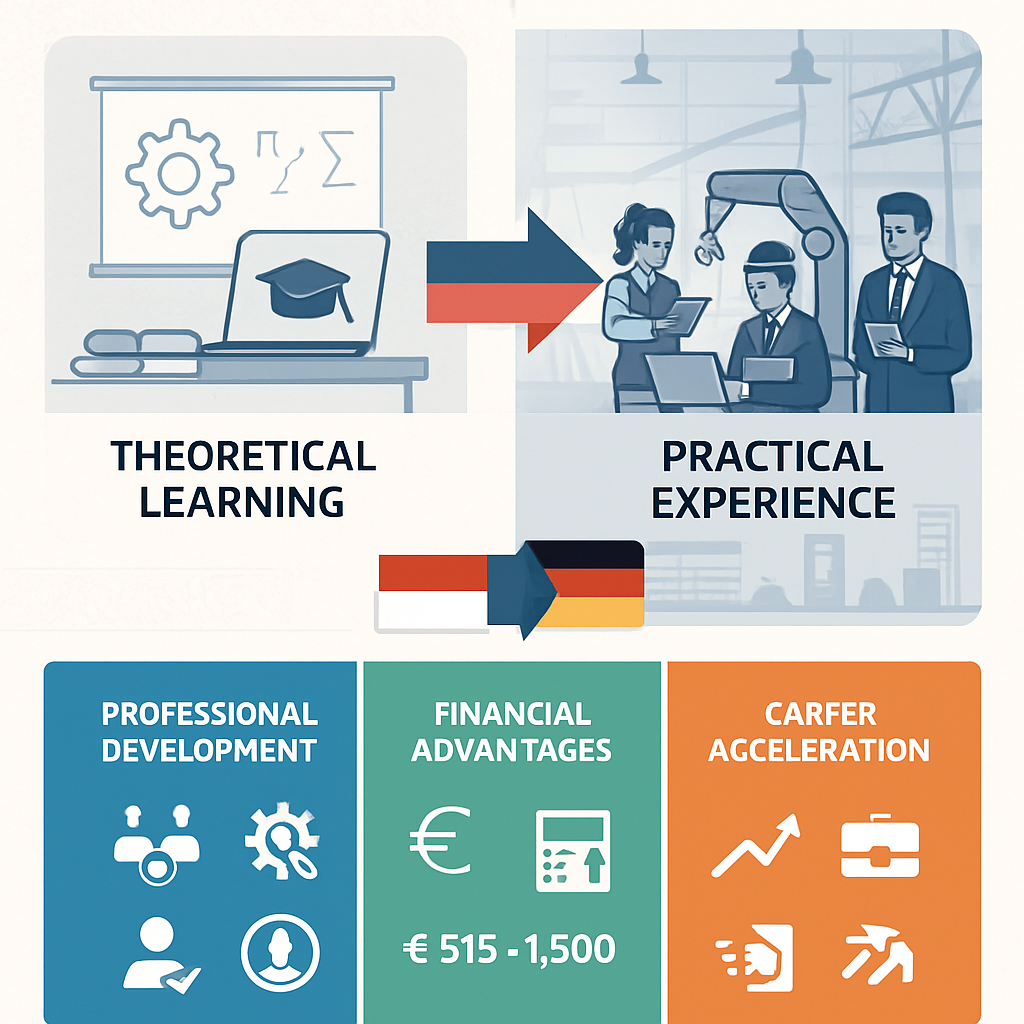
Financial Advantages:
- Earning while learning: Monthly apprentice salaries ranging from €515-1,500
- No student debt: Training costs covered by employers and government
- Quick ROI: Faster transition to full-time employment compared to university graduates
Career Acceleration:
- Employer preference: German companies highly value Ausbildung graduates
- Leadership pipeline: Many German executives started with Ausbildung
- Specialization opportunities: Deep expertise in chosen field
Career Prospects and Earning Potential After Ausbildung Completion
Ausbildung graduates enjoy excellent career trajectories with multiple advancement pathways:
Immediate Post-Completion Opportunities:
- High employment rate: 95% of Ausbildung graduates find employment within 6 months
- Starting salaries: €2,500-4,000 monthly depending on field and location
- Job security: Strong demand for skilled workers across industries
Popular Ausbildung Fields for International Students:
- IT and Technology: Software development, system administration
- Healthcare: Nursing, medical technology, physiotherapy
- Engineering: Mechanical, electrical, automotive technology
- Business: Banking, logistics, international trade
- Hospitality: Hotel management, culinary arts
Long-term Career Progression:
- Further education options: Meister qualifications, Techniker programs, or university studies
- Entrepreneurship: Strong foundation for starting own businesses
- International opportunities: German qualifications recognized globally
- Leadership roles: Pathway to management positions in German companies
Why Indonesian Professionals Are Choosing Germany
Economic Opportunities and Salary Comparisons
The economic advantages of pursuing Ausbildung in Germany versus remaining in Indonesia are substantial:
Salary Comparison (Monthly Averages):
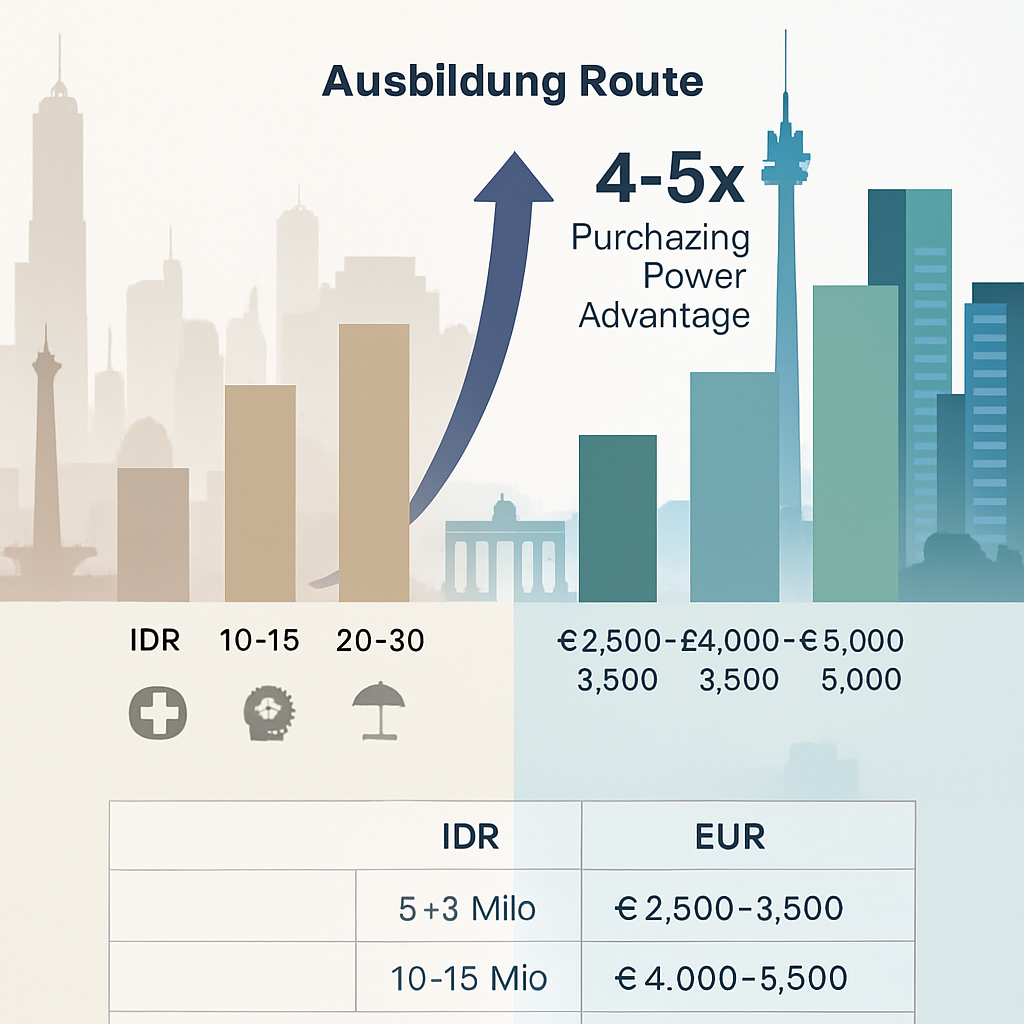
| Career Level | Indonesia (IDR) | Germany (EUR) | Purchasing Power Advantage |
|---|---|---|---|
| Entry-level skilled worker | 5-8 million | €2,500-3,500 | 4-5x higher |
| Mid-level professional | 10-15 million | €4,000-5,500 | 3-4x higher |
| Senior specialist | 20-30 million | €6,000-8,000 | 2-3x higher |
Additional Economic Benefits:
- Currency stability: Euro provides protection against inflation
- Comprehensive benefits: Health insurance, pension contributions, vacation pay
- Career mobility: Access to broader European job market
- Investment opportunities: Higher savings potential for future investments
Germany's Skilled Worker Shortage and High Demand for International Talent
Germany faces significant demographic challenges creating exceptional opportunities for Indonesian professionals:
Current Shortage Statistics:
- 2 million skilled positions currently unfilled across Germany
- Projected need: 7 million skilled workers by 2035
- Priority sectors: Healthcare, IT, engineering, renewable energy
Government Initiatives Supporting International Workers:
- Skilled Immigration Act: Streamlined visa processes for qualified professionals
- Recognition procedures: Fast-track qualification recognition for international credentials
- Language support: Subsidized German language preparation guide courses
- Integration programs: Comprehensive settlement assistance
High-Demand Fields for Indonesians:
- Digital technology: Software development, cybersecurity, data analytics
- Renewable energy: Solar and wind technology specialists
- Healthcare: Nursing, elderly care, medical technology
- Manufacturing: Automotive, machinery, chemical industries
- Logistics: Supply chain management, international trade
Quality of Life, Work-Life Balance, and Social Benefits
Germany offers exceptional quality of life standards that attract Indonesian professionals:
Work-Life Balance Features:
- 35-40 hour work weeks: Standard across most industries
- 6 weeks paid vacation: Minimum legal requirement
- Flexible working: Remote work and flexible hours increasingly common
- Job protection: Strong employment laws preventing arbitrary dismissal
Social Benefits System:
- Universal healthcare: Comprehensive medical coverage for families
- Education: Free university education for children
- Parental support: Generous maternity/paternity leave policies
- Unemployment protection: Financial support during job transitions
Quality of Life Indicators:
- Safety: Low crime rates, political stability
- Infrastructure: Excellent public transportation, digital connectivity
- Environment: Clean air, green spaces, environmental protection
- Cultural diversity: Welcoming international communities
Family Considerations:
- Spouse employment: Work permits for family members
- Child benefits: Monthly payments for each child (€250+)
- Education quality: World-class schooling systems
- Integration support: Language courses and cultural orientation for families
The combination of economic opportunity, professional development, and quality of life makes Germany an increasingly attractive destination for Indonesian professionals seeking international career advancement through the Ausbildung pathway.
Popular Ausbildung programs for Indonesian Students
Indonesian professionals seeking career advancement through Germany's Ausbildung system gravitate toward specific sectors that offer strong employment prospects and align with their educational backgrounds. Here's a detailed comparison of the most sought-after programs:
Healthcare Sector: Nursing, Medical Technology, and Pharmaceutical Roles
Nursing (Pflegefachmann/Pflegefachfrau)
- Duration: 3 years
- Monthly salary during training: €1,140-1,300
- Post-completion salary: €3,200-4,500
- Key advantage: High demand with guaranteed job placement
Medical Technology Specialist
- Duration: 3.5 years
- Training salary: €950-1,200 monthly
- Career salary: €3,800-5,200
- Specializations: Laboratory diagnostics, radiology, medical device maintenance
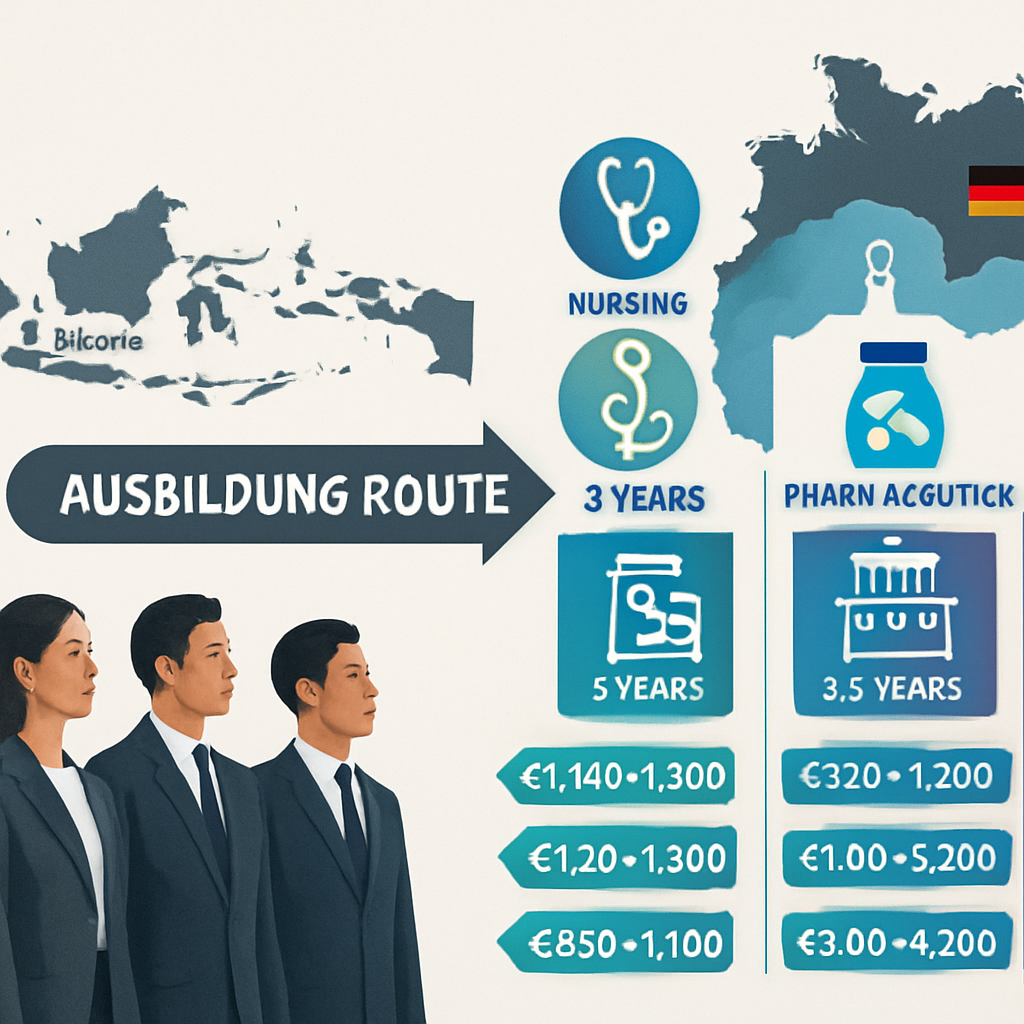
Pharmaceutical Technical Assistant
- Duration: 2.5 years
- Training compensation: €850-1,100
- Professional salary: €3,000-4,200
- Growth sectors: Research facilities, hospital pharmacies
| Program | Duration | Training Salary | Career Prospects |
|---|---|---|---|
| Nursing | 3 years | €1,140-1,300 | Excellent (aging population) |
| Medical Tech | 3.5 years | €950-1,200 | Very Good (digitalization) |
| Pharmaceutical | 2.5 years | €850-1,100 | Good (research growth) |
Engineering and Manufacturing: Automotive, Mechanical, and Industrial Technology
Automotive Mechatronics
- Perfect for Indonesian students with technical backgrounds
- Companies like BMW, Mercedes-Benz, and Volkswagen actively recruit
- Combines mechanical engineering with electronics
- Starting salary post-Ausbildung: €3,500-4,800
Industrial Mechanics
- High demand in Germany's manufacturing sector
- Opportunities in renewable energy and automation
- Strong pathway to engineering management roles
- Career progression often leads to Meister certification
Mechanical Engineering Technology
- Builds on Indonesia's growing manufacturing expertise
- Focus on precision engineering and quality control
- Excellent for students from Jakarta's industrial areas
IT and Digital Technologies: Software Development and Cybersecurity Programs
Application Development (Fachinformatiker Anwendungsentwicklung)
- Duration: 3 years
- Ideal for Indonesian students with programming experience
- Training with companies like SAP, Siemens, or tech startups
- Post-training salary: €3,800-5,500
System Integration Specialist
- Focus on network administration and cybersecurity
- Growing demand due to digital transformation
- Opportunities in both corporate and government sectors
Digital and Print Media Technology
- Emerging field combining traditional media with digital innovation
- Suitable for creative Indonesian professionals
- Strong freelance and entrepreneurship opportunities
Step-by-Step Application Process from Jakarta
Language Requirements: German Proficiency Levels and Preparation Timeline
Minimum Requirements:
- B1 level German for most technical programs
- B2 level for healthcare and customer-facing roles
- C1 level preferred for competitive positions
12-Month Preparation Timeline:
Months 1-3: Foundation Building
- Enroll in Goethe Institute Jakarta or online platforms
- Target: A1-A2 certification
- Daily study: 2-3 hours minimum
- Focus: Basic grammar and vocabulary
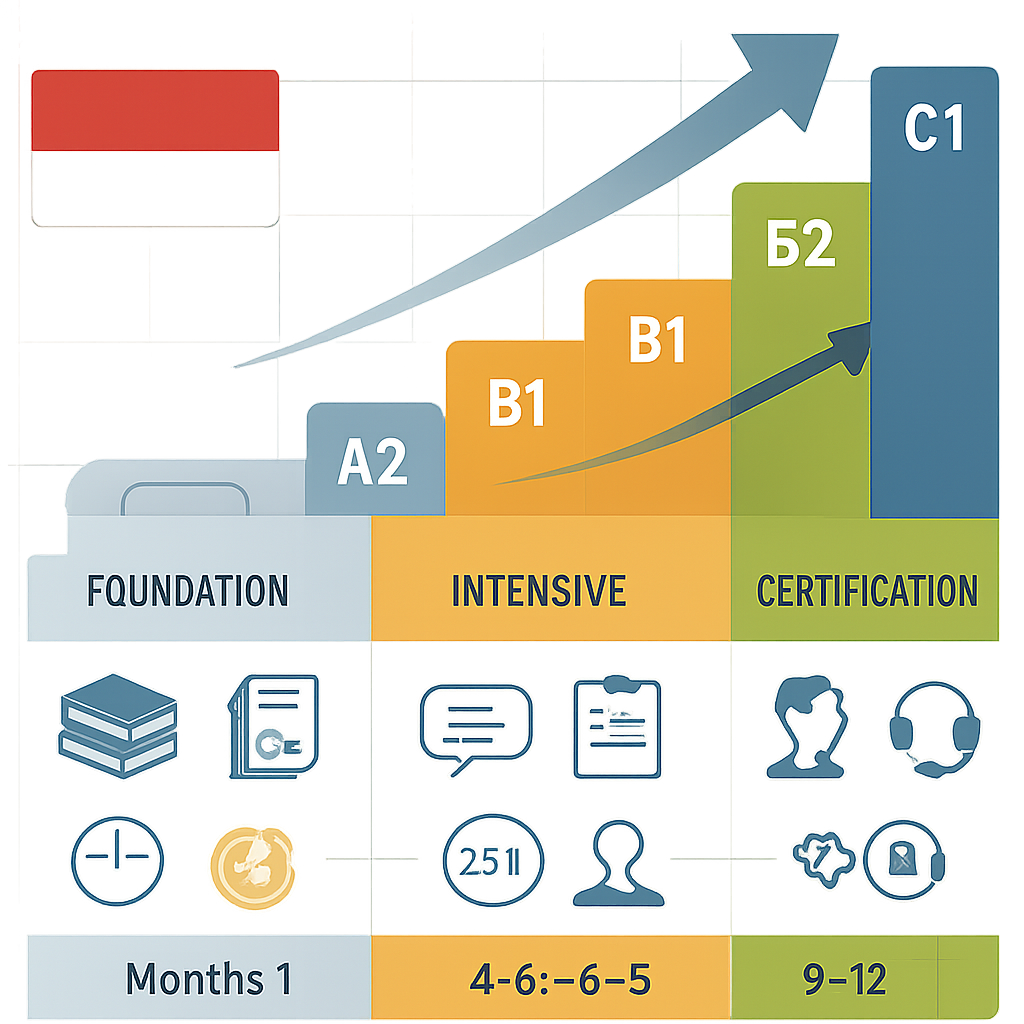
Months 4-8: Intensive Development
- Advance to B1 level
- Join conversation groups at German cultural centers
- Practice technical vocabulary for chosen field
- Consider intensive summer courses
Months 9-12: Certification and Refinement
- Achieve B2 certification
- Focus on industry-specific terminology
- Practice job interview scenarios in German
- Complete TestDaF or telc examinations
Document Preparation and Credential Recognition Procedures
Essential Documents Checklist:
- Educational Certificates
- High school diploma (translated and apostilled)
- University transcripts (if applicable)
- Professional certifications
- Personal Documentation
- Passport (minimum 18 months validity)
- Birth certificate (translated)
- Police clearance certificate
- Medical examination results
- Recognition Process
- Submit documents to ZAB (Central Office for Foreign Education)
- Processing time: 4-8 weeks
- Cost: €100-200 depending on complexity
- Document collection: 2-4 weeks
- Translation and apostille: 3-4 weeks
- Recognition process: 6-8 weeks
- Total preparation time: 3-4 months
- Official Platforms
- Bundesagentur für Arbeit job portal
- IHK (Chamber of Commerce) regional websites
- Company career pages
- Indonesian-German Networks
- Indonesian Student Association in Germany (PPI)
- DAAD Jakarta office connections
- German-Indonesian Chamber of Commerce partnerships
- Direct Company Applications
- Research major German employers in your field
- Attend virtual job fairs from Jakarta
- Leverage LinkedIn for professional networking
- Apply to 15-20 positions minimum
- Customize cover letters for each application
- Prepare for video interviews (common for international candidates)
- Follow up professionally after 2-3 weeks
- Application submission: 3-6 months before desired start date
- Interview process: 4-8 weeks
- Visa processing: 6-12 weeks
- Total process: 6-12 months from initial application
- Structured Learning Path: Start with A1 basics at Goethe Institut Jakarta, then supplement with online platforms like Babbel or Duolingo for daily practice
- Immersive Practice: Join German conversation clubs at cultural centers or connect with German expats through Jakarta's international community
- Professional Preparation: Focus on industry-specific vocabulary once you reach B1 level - technical terms for engineering, hospitality phrases for hotel management
- Goethe Institut Jakarta: Offers structured courses from A1-C2 levels
- German-Indonesian Chamber of Commerce: Provides business German classes
- Private tutoring services: Average cost IDR 200,000-400,000 per hour
- Language exchange programs with German students studying in Jakarta universities
- Communication Style: Germans value directness and constructive criticism as professional development, not personal attacks
- Work-Life Balance: Strict separation between work hours and personal time is respected and expected
- Hierarchy and Feedback: Flatter organizational structures encourage input from junior employees
- Join Indonesian student associations in German cities (most major cities have active Indonesian communities)
- Participate in company social events and local sports clubs
- Utilize LinkedIn to connect with Indonesian Ausbildung alumni before departure
- Engage with local chambers of commerce for industry-specific networking
- Year 1: €500-800/month
- Year 2: €600-900/month
- Year 3: €700-1,200/month
- BAföG assistance for qualifying international students
- Company-specific scholarships (particularly in healthcare and IT sectors)
- Part-time work allowance: 120 full days or 240 half-days annually
- Housing allowances (Wohngeld) for low-income trainees
- 87% of Ausbildung graduates receive permanent employment offers
- Average promotion timeline: 2-3 years for first advancement
- Access to continuous education programs funded by employers
- Higher job security compared to university graduates in practical fields
- Training Period: Student visa/residence permit for Ausbildung duration
- Post-Graduation: 18-month job search permit, often extended for employment
- Employment-Based: 2-4 year renewable work permits leading to permanent residence
- Permanent Residence: Available after 5 years of continuous legal residence
- 8 years legal residence (reduced to 6 with integration course completion)
- B1 German proficiency certification
- Financial stability demonstration
- Clean criminal record
- Research Ausbildung programs and identify 5-10 target occupations
- Begin intensive German language learning (aim for B1-B2 level)
- Start gathering academic transcripts and certificates
- Research companies offering Ausbildung in your chosen field
- Take German language proficiency tests (TestDaF, DSH, or Goethe certificates)
- Prepare application documents (CV, motivation letter, certificates)
- Contact potential employers and training companies
- Begin visa application research and document collection
- Submit applications to companies (most accept applications 6-12 months in advance)
- Prepare for interviews (often conducted via video call)
- Finalize language certification requirements
- Secure accommodation arrangements in Germany
- Complete visa application process
- Arrange health insurance and banking
- Book flights and prepare for departure
- Connect with other Indonesian students in Germany
- Goethe Institut Jakarta: Offers comprehensive German language programs from A1 to C2 levels, with specialized courses for professional contexts
- Private Language Schools: Institutions like Benedict School and EF Education First provide German language training
- Online Platforms: Babbel, Deutsche Welle's free courses, and Lingoda offer flexible learning options
- Indonesian-German Chamber of Commerce: Provides networking opportunities and industry insights
- Alumni Networks: Connect with Indonesians who have completed Ausbildung programs
- Facebook Groups: "Indonesians in Germany" and "Ausbildung Indonesia" offer peer support and practical advice
- Language Assessment: Take a free online German placement test to determine your current level
- Field Research: Identify 3-5 Ausbildung fields that match your interests and career goals
- Financial Planning: Calculate total costs including language courses, visa fees, travel, and living expenses for the first year
- Enroll in German Language Course: Begin with intensive classes at Goethe Institut or equivalent
- Document Preparation: Gather and translate all academic certificates and work experience documents
- Network Building: Join relevant social media groups and attend German cultural events in Jakarta
- Language Proficiency: Achieve B1 level German (minimum requirement for most programs)
- Company Research: Create a database of 20-30 companies offering Ausbildung in your chosen field
- Application Materials: Develop German-language CV and motivation letters tailored to specific programs
- Quality over Quantity: Apply to 8-12 carefully selected positions rather than mass applications
- Follow-up Protocol: Maintain professional communication with potential employers
- Interview Preparation: Practice common interview questions in German with native speakers
- Secure housing arrangements (student dormitories, shared apartments, or host families)
- Arrange health insurance coverage valid in Germany
- Open German bank account or research banking options
- Connect with local Indonesian communities in your destination city
Timeline for Document Preparation:
Finding Ausbildung Positions and Employer Partnerships
Primary Search Channels:
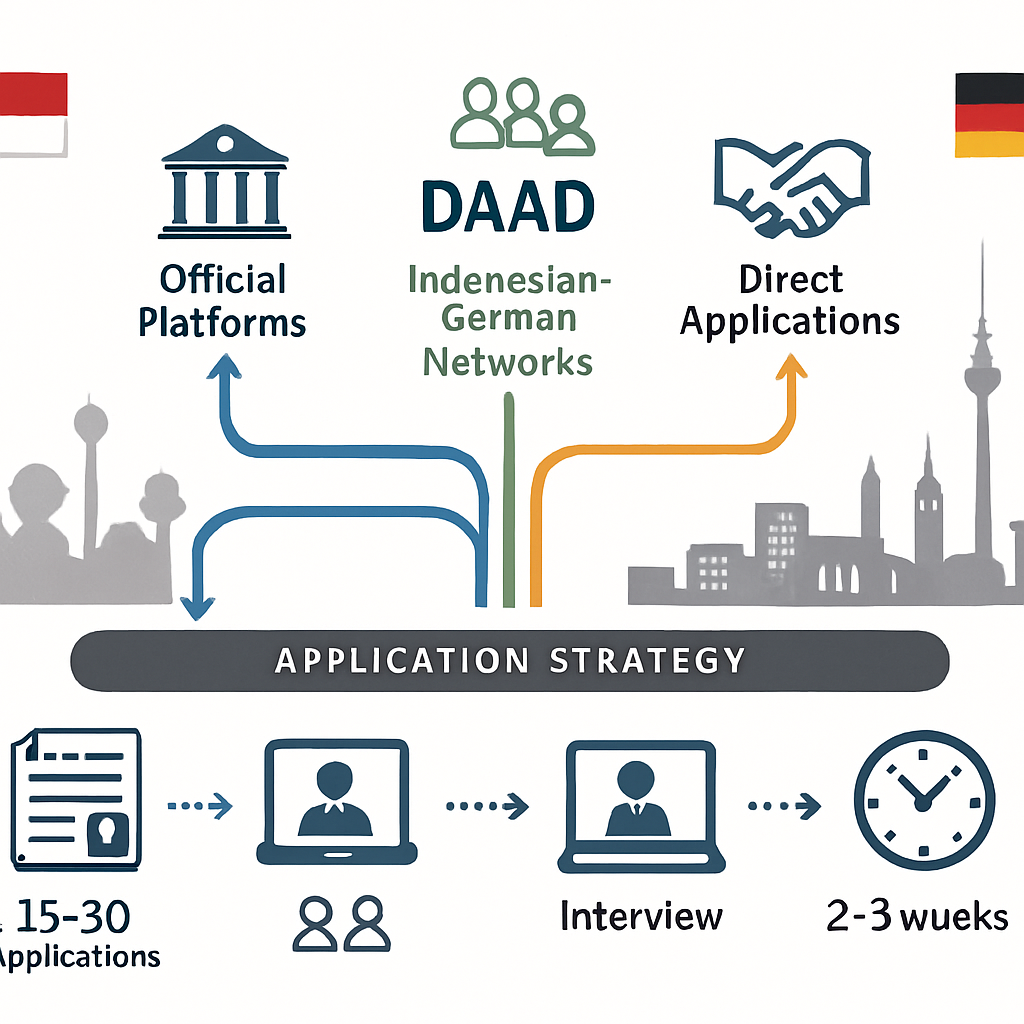
Application Strategy:
Success Timeline:
Overcoming Common Challenges and Barriers
Language Learning Strategies and Resources Available in Jakarta
The German language requirement often intimidates prospective Ausbildung candidates, but Jakarta offers numerous resources to master this challenge. Most programs require B1-B2 level German proficiency, which typically takes 12-18 months of dedicated study.
Effective Learning Strategies:
Jakarta-Based Resources:
Cultural Adaptation Tips and Building Professional Networks
German workplace culture emphasizes punctuality, direct communication, and structured processes - significantly different from Indonesian professional environments.
Key Cultural Adaptations:
Network Building Strategies:
Financial Planning: Costs, Scholarships, and Earning While Learning
Initial Investment Breakdown:
| Expense Category | Cost Range (EUR) | Notes |
|---|---|---|
| Visa Application | 75-100 | Student visa fees |
| Language Courses | 1,500-3,000 | 12-18 months preparation |
| First-Year Living | 8,000-12,000 | Accommodation, food, transport |
| Health Insurance | 1,200 | Annual mandatory coverage |
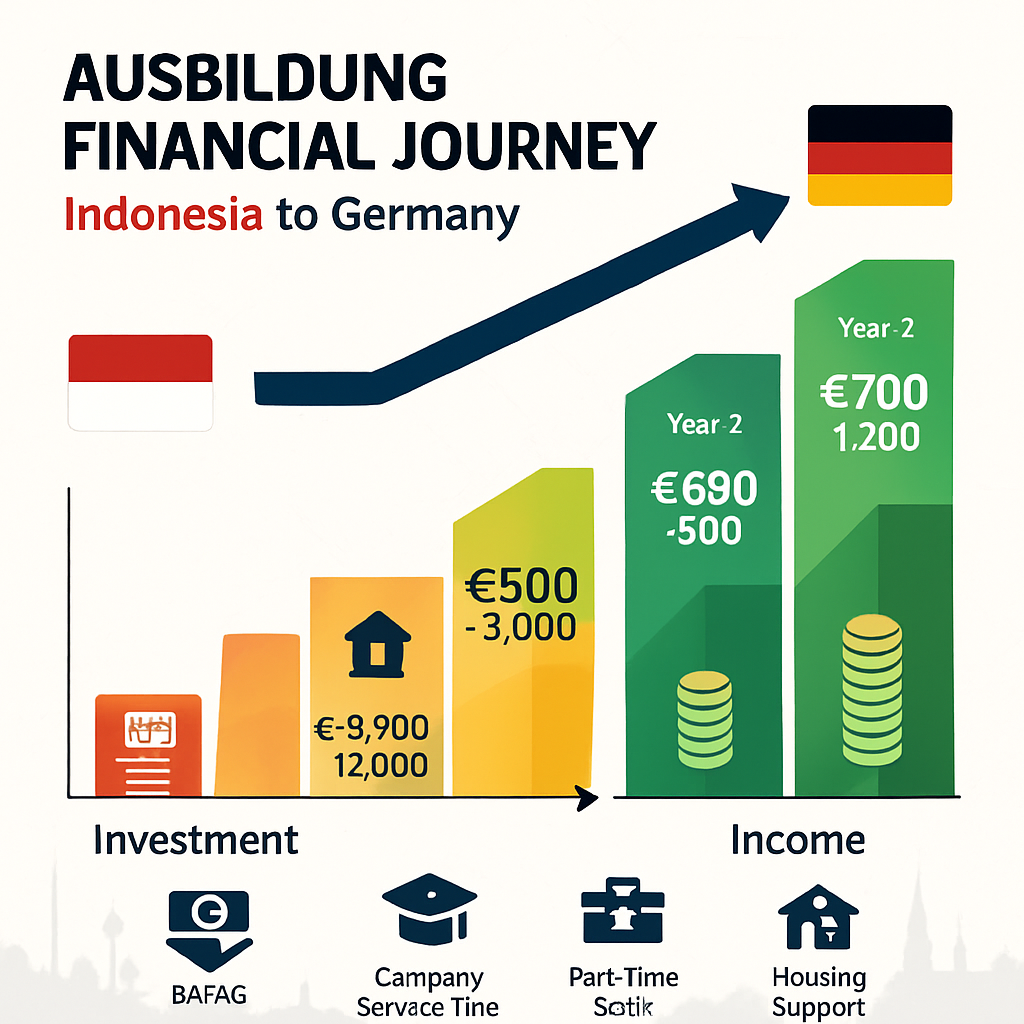
Income During Ausbildung:
Ausbildung participants receive monthly salaries that increase yearly:
Available Financial Support:
success stories from Indonesian Ausbildung Graduates
Career Progression Examples in Different Industries
Technology Sector - Ahmad's Journey:
Ahmad completed his IT Systems Integration Ausbildung in Munich in 2019. Starting as a junior developer at €2,200/month, he progressed to senior systems analyst earning €4,500/month within three years. His dual education background gave him practical skills that university graduates often lack.
Healthcare Success - Sari's Path:
Sari pursued nursing Ausbildung in Hamburg, initially earning €1,100/month during training. Post-graduation, she secured a position at a major hospital earning €3,200/month. The critical shortage of healthcare workers in Germany provided rapid career advancement opportunities.
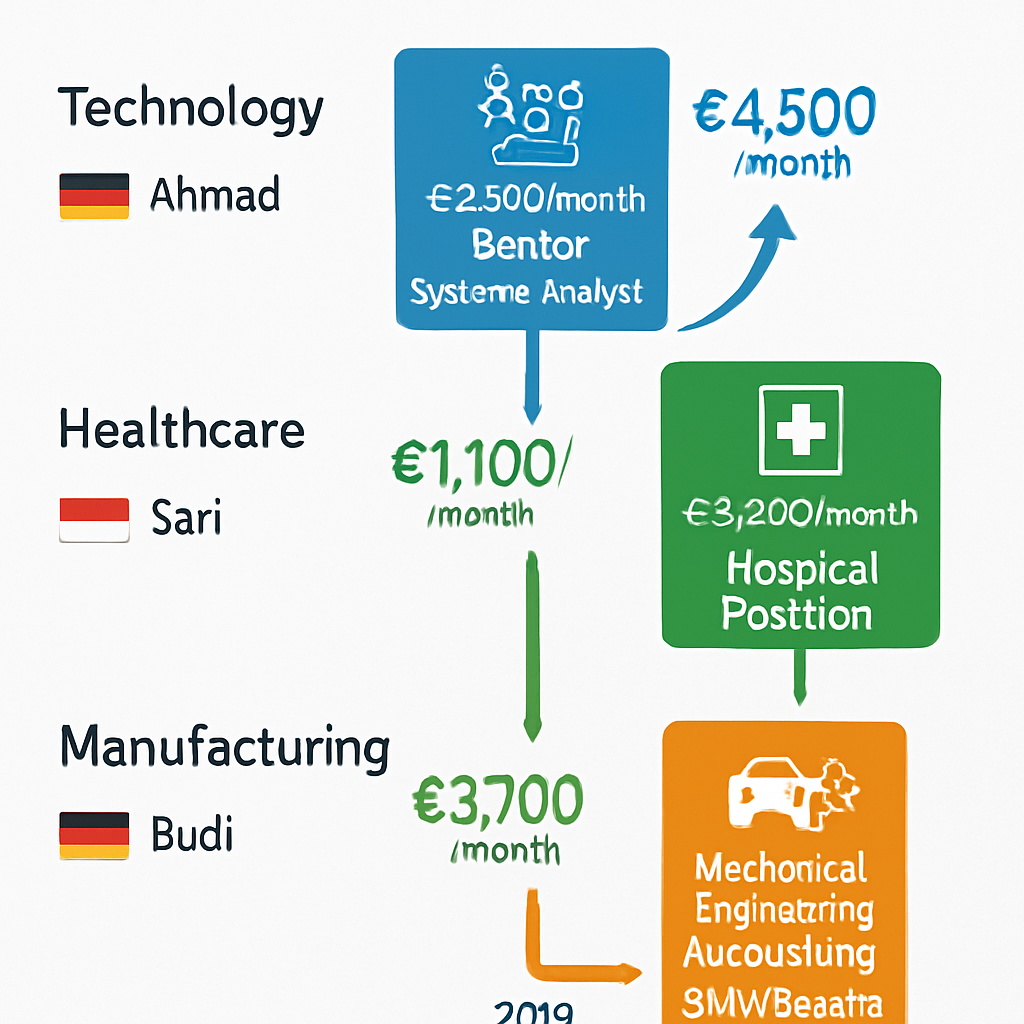
Manufacturing Excellence - Budi's Achievement:
Budi completed mechanical engineering Ausbildung with BMW in Bavaria. His progression from apprentice to production supervisor took four years, with salary growth from €800/month to €4,800/month. German automotive companies highly value Ausbildung graduates for leadership positions.
Salary Growth and Professional Development Outcomes
Average Salary Progression (EUR/month):
| Industry | Year 1 | Year 3 | Year 5 | Year 10 |
|---|---|---|---|---|
| IT/Technology | 2,200 | 3,500 | 4,800 | 6,500+ |
| Healthcare | 2,800 | 3,400 | 4,200 | 5,200+ |
| Engineering | 2,500 | 3,800 | 5,200 | 7,000+ |
| Hospitality | 1,800 | 2,400 | 3,200 | 4,000+ |
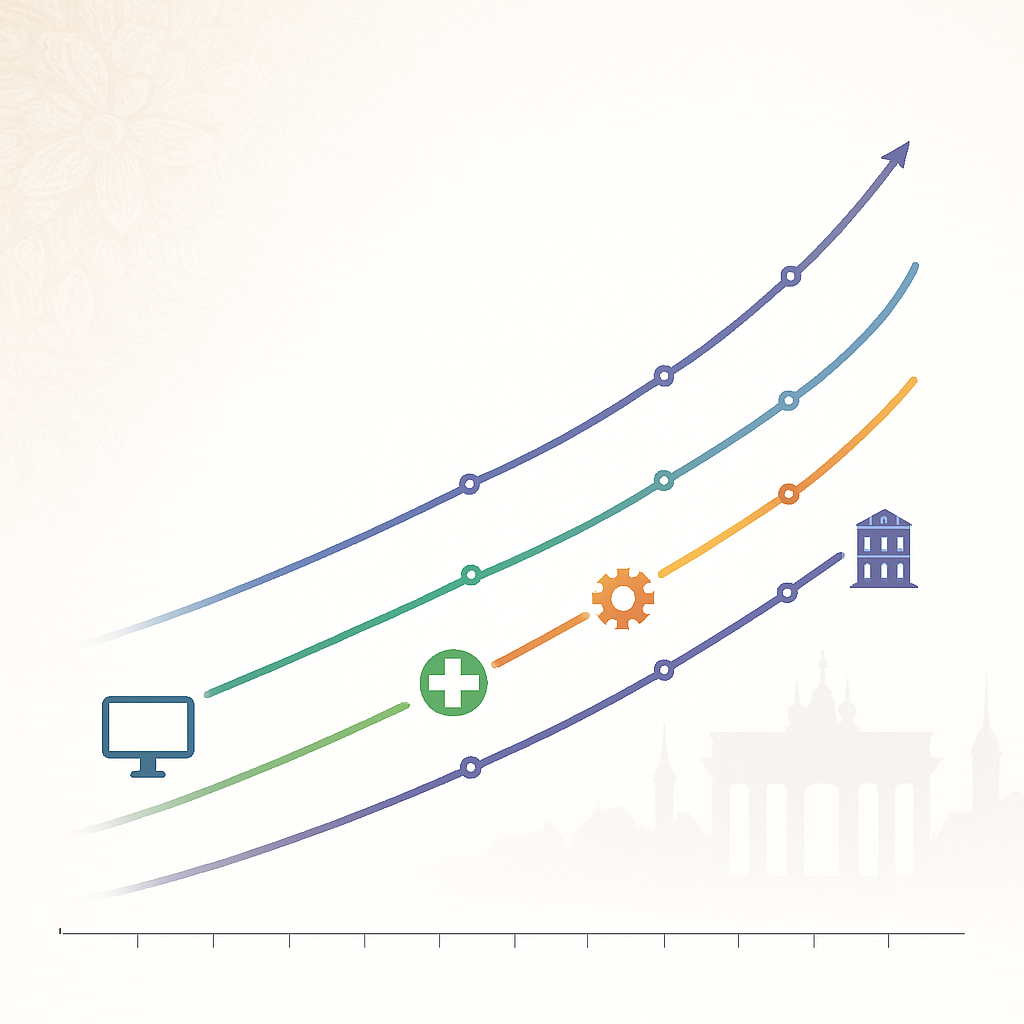
Professional Development Benefits:
Long-term Settlement and Citizenship Pathways
Residence Permit Progression:
Citizenship Timeline:
Indonesian Ausbildung graduates typically achieve German citizenship within 6-8 years through the naturalization process. Key requirements include:
Family Reunification Success:
Many graduates successfully bring spouses and children to Germany within 2-3 years of employment. The stable income from Ausbildung careers meets family visa financial requirements, with 73% of married graduates achieving family reunification within five years.
The combination of practical skills, cultural integration, and structured career progression makes Ausbildung an increasingly attractive pathway for Indonesian professionals seeking European opportunities.
Preparing for Your Ausbildung Journey
Timeline for Application Preparation (12-18 Months in Advance)
Success in securing an Ausbildung position requires strategic planning and early preparation. The competitive nature of popular programs means starting your preparation 12-18 months before your intended start date is essential.
18-15 Months Before:
12-9 Months Before:
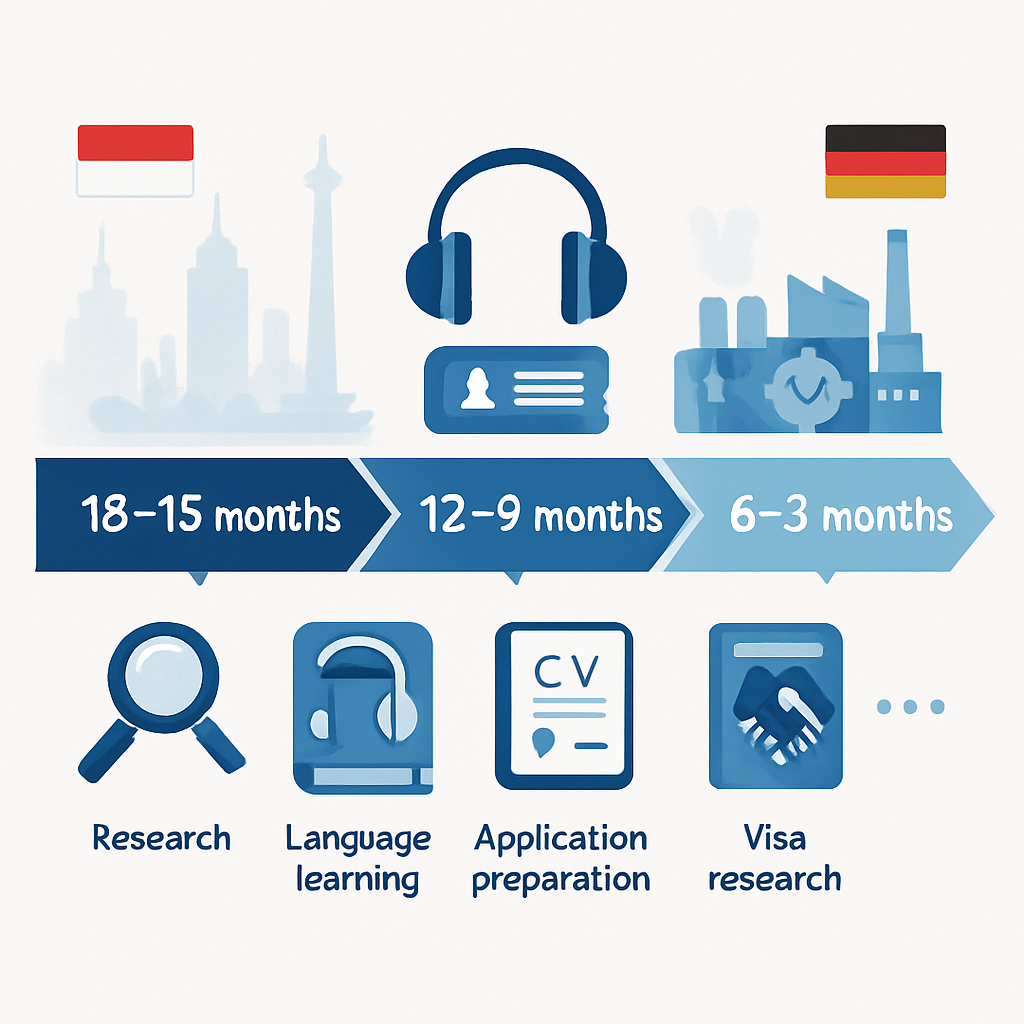
6-3 Months Before:
1-3 Months Before:
Essential Resources and Support Organizations in Jakarta
Government and Official Resources:
| Organization | Services Offered | Contact Information |
|---|---|---|
| German Embassy Jakarta | Visa processing, official information | Jl. M.H. Thamrin No. 1, Jakarta |
| DAAD Jakarta | Educational counseling, scholarship info | Plaza Bapindo, Tower 2, 5th Floor |
| Goethe Institut Jakarta | German language courses, cultural programs | Jl. Sam Ratulangi No. 9-15 |
Educational Support:
Professional Networks:
Next Steps and Action Plan for Prospective Applicants
Immediate Action Items (Week 1-2):
Short-term Goals (Month 1-3):
Medium-term Objectives (Month 4-12):
Application Phase Strategy:
Pre-departure Checklist:
The key to success lies in consistent preparation and leveraging available resources. Many successful Indonesian Ausbildung graduates emphasize the importance of starting early and maintaining persistence throughout the application process. Remember that rejection is common—most successful applicants apply to multiple programs before securing their ideal position.
Frequently Asked Questions
Question 1: What emergency contacts and support systems are available for Indonesian students during Ausbildung in Germany?
Every Indonesian student should maintain contact with the Indonesian Embassy in Berlin (+49-30-478007-0) and consulates in other major cities. Most Ausbildung programs assign mentors or support coordinators who speak English. Register with local Indonesian student associations like PPI (Perhimpunan Pelajar Indonesia) for peer support networks. Keep emergency numbers for police (110), fire/medical (112), and your training company's HR department. Many cities offer international student helplines with multilingual support. Download apps like "Nora" for emergency services and "NINA" for official warnings. Establish relationships with local Indonesian communities through mosques, cultural centers, or Facebook groups. Your Ausbildung provider typically offers counseling services for work-related issues, while universities often provide psychological support services that Ausbildung students can access.
Question 2: How do I handle homesickness and cultural adjustment during the initial months of Ausbildung?
Cultural shock typically peaks around months 2-4, so prepare mentally for this adjustment period. Stay connected with family through regular video calls but avoid excessive contact that prevents local integration. Join Indonesian community groups and local hobby clubs to build diverse social networks. Learn basic German phrases for daily interactions – even simple greetings help build confidence. Many cities offer free cultural orientation programs for international residents. Practice German culture gradually by trying local foods, attending festivals, and understanding workplace etiquette. Keep familiar comfort items from Indonesia but embrace new experiences. Most Ausbildung programs provide cultural mentorship or buddy systems. If homesickness becomes overwhelming, utilize counseling services offered by your training company or local international student support centers. Remember that cultural adaptation is gradual – give yourself 6-12 months to feel settled.
Question 3: What are the realistic monthly living costs for Indonesian students during Ausbildung, and how can I budget effectively?
Monthly costs vary by city: Berlin/Hamburg €800-1200, Munich/Frankfurt €1000-1500, smaller cities €600-1000. Ausbildung salaries range €515-1500 monthly depending on field and year. Budget breakdown: rent (40-50% of income), food (€200-300), transport (€60-90 student discount), health insurance (€110), phone (€20-40), miscellaneous (€100-200). Money-saving tips: share apartments (WG), cook at home, use student discounts, shop at discount supermarkets like Aldi/Lidl. Apply for housing assistance (Wohngeld) if eligible. Many Ausbildung companies offer additional benefits like meal vouchers or transport subsidies. Open a German bank account immediately for lower fees. Use apps like "Too Good To Go" for discounted food. Consider part-time work restrictions (maximum hours vary by program). Emergency fund recommendation: save 2-3 months of expenses before arriving.
Question 4: Can I switch Ausbildung programs or companies if I'm unhappy with my choice?
Yes, but timing and approach matter significantly. Within the first 4 months (probation period), either party can terminate without specific reasons. After probation, you need valid justification like inadequate training, workplace conflicts, or career direction changes. Document any training deficiencies or workplace issues thoroughly. Consult your local Chamber of Commerce (IHK/HWK) which oversees Ausbildung quality – they can mediate disputes or validate concerns. Before switching, attempt resolution through direct communication with supervisors or HR departments. If switching, you'll need to find a new company willing to accept transfer students, which can be challenging mid-program. Some credits may transfer, but you might restart certain modules. Consider switching fields only if absolutely necessary, as it may extend your completion timeline. Seek advice from career counselors at local employment offices (Arbeitsagentur) who can guide you through proper procedures and help identify alternative opportunities.
Question 5: How do I maintain my Indonesian citizenship while potentially pursuing German permanent residency?
Indonesia doesn't recognize dual citizenship, requiring careful long-term planning. During Ausbildung and initial work years, maintain Indonesian citizenship and renew your Indonesian passport regularly through embassies/consulates. For German permanent residency, you'll need 5 years of continuous residence, adequate German language skills (B1 level), financial stability, and clean criminal record. Consider your long-term goals: returning to Indonesia with German qualifications, or permanent settlement in Germany. If choosing German citizenship later, you must formally renounce Indonesian citizenship first. However, recent Indonesian diaspora policies offer some flexibility for former citizens. Consult both Indonesian embassy legal advisors and German immigration lawyers for personalized guidance. Document all your German residence periods carefully. Some Indonesians maintain strong Germany ties through long-term residence permits rather than citizenship. Plan this decision carefully as it affects family visits, property ownership in Indonesia, and retirement options.
Question 6: What happens if I fail my Ausbildung exams, and what are my options for recovery?
Ausbildung includes interim exams and final certification exams administered by Chambers of Commerce. If you fail interim exams, you typically receive additional support, tutoring, or extended training periods. Most programs offer 2-3 retake opportunities for final exams. Failed students can request training period extensions (usually 6-12 months) to improve skills and knowledge. Your training company and vocational school will develop improvement plans identifying weak areas. Utilize additional resources: evening classes, online learning platforms, study groups with classmates, and private tutoring. Some chambers offer special preparation courses for repeat candidates. If you repeatedly fail, consider switching to a related but less demanding Ausbildung field. Worst-case scenario: incomplete Ausbildung still provides valuable work experience and German language skills. You might pursue alternative qualifications through adult education centers or consider returning to Indonesia with gained experience. Don't panic – many students need extra time, and German system supports various pathways to success.
Question 7: How can I leverage my Ausbildung experience to eventually bring family members to Germany?
Successful Ausbildung completion and subsequent employment create pathways for family reunification. After completing Ausbildung and securing permanent employment, you can apply for family reunification visas for spouses and minor children. Requirements include stable income (usually 1.5x social assistance levels), adequate housing, basic German language proof from family members, and health insurance coverage for all family members. The process typically takes 6-12 months and requires extensive documentation. Start preparing early: maintain strong employment records, secure appropriate housing, and help family members begin German language learning in Indonesia. Adult children (18+) and parents face stricter requirements and longer waiting periods. Consider pursuing German permanent residency or EU Blue Card status to strengthen your application. Consult immigration lawyers specializing in family reunification. Some Indonesian families use education routes – bringing children for university studies while parents remain in Indonesia. Plan financially as the process involves significant costs for visas, housing deposits, and initial settlement expenses.
Question 8: What are the pathways for career advancement after completing Ausbildung, and how do they compare to university graduates?
Ausbildung graduates have multiple advancement options often overlooked by traditional university-focused cultures. Immediate pathway: "Meister" or "Techniker" qualifications (equivalent to bachelor's degree level) accessible after 2-3 years work experience. These programs combine advanced technical skills with management training, often leading to supervisory roles or business ownership. Alternatively, pursue "Studium" (university studies) – Ausbildung graduates gain direct university access in related fields, often completing degrees faster due to practical experience. Many companies prefer promoting internally, valuing practical experience over theoretical knowledge. Salary progression can match or exceed university graduates, especially in technical fields, skilled trades, or specialized industries. Entrepreneurship opportunities are significant – many successful German businesses are founded by Ausbildung graduates with deep industry knowledge. Consider dual pathways: working part-time while studying, or company-sponsored further education. German employers highly value the practical competencies and work ethic developed through Ausbildung, often providing clear promotion tracks and professional development opportunities.
Conclusion
The Ausbildung pathway represents more than just an educational opportunity—it's a proven bridge to professional success that countless Indonesian professionals have already crossed. The key takeaways are clear: Germany's dual education system offers you the unique advantage of earning while learning, combining theoretical knowledge with hands-on experience that employers worldwide value. Unlike traditional university paths, Ausbildung graduates enter the job market with practical skills, guaranteed employment prospects, and competitive salaries that often exceed those of university graduates. Most importantly, the success stories from Jakarta professionals demonstrate that this isn't just a distant dream—it's an achievable reality for motivated individuals ready to invest in their future.
The path forward is straightforward but requires decisive action. Start by researching specific Ausbildung programs that align with your interests and career goals, whether in healthcare, engineering, IT, or skilled trades. Simultaneously, begin your German language learning journey—this investment will pay dividends throughout your career. Gather your required documents early, including academic transcripts, certificates, and passport documentation. Remember, every successful Indonesian professional in Germany started exactly where you are now, with a decision to take the first step.
Your hesitations are natural—moving to a new country, learning a new language, and adapting to a different culture requires courage. However, consider the alternative: staying in your comfort zone while opportunities for exponential career growth pass you by. The Indonesian professionals who chose Germany didn't have any special advantages—they simply had the vision to see beyond temporary challenges toward long-term success. Germany's structured support system, combined with the earning potential during training, makes this transition far more manageable than you might imagine.
Don't let uncertainty delay your success story. GoAusbildung's experienced advisors are ready to transform your aspirations into a concrete action plan, guiding you through every step from application to arrival in Germany. Schedule your consultation today and join the growing community of Indonesian professionals who chose the Ausbildung route to build extraordinary careers. Your German success story begins with a single conversation—make that call now.
About GoAusbildung
Comprehensive resource for guidance on Ausbildung programs in Germany
Ready to Start Your Ausbildung Journey in Germany?
Explore our resources and get personalized guidance to find the perfect Ausbildung program aligned with your career goals.